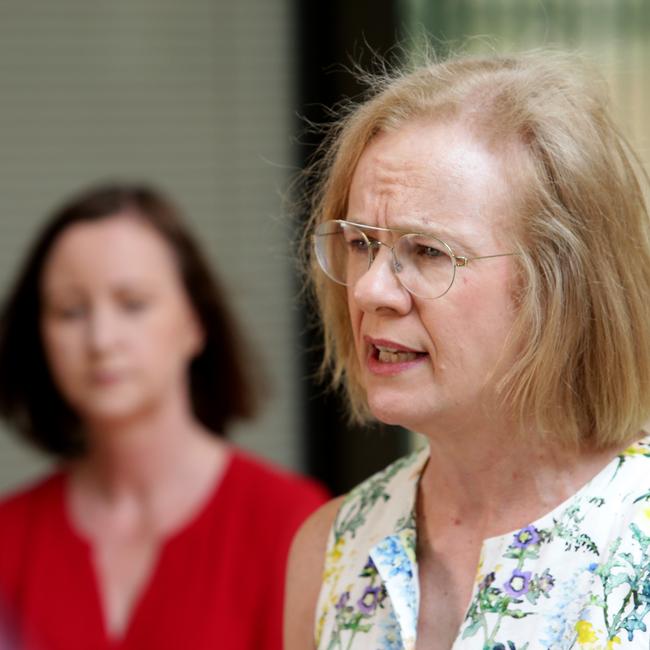Coronavirus Qld: South African strain detected in state
A young Queensland woman has tested positive to the South African strain of coronavirus, with authorities warning the risk of an outbreak is escalating.
QLD Coronavirus News
Don't miss out on the headlines from QLD Coronavirus News. Followed categories will be added to My News.
The South African strain of coronavirus – which may be more contagious – has been detected in Queensland, putting officials on high alert that the risk of an outbreak is escalating.
The Sunshine Coast woman, aged in her 20s, arrived in Queensland from South Africa on December 22 and was in hotel quarantine when she tested positive. She was now in Sunshine Coast University Hospital.
Health Minister Yvette D’Ath said it was the first positive case of the South African variant in Australia.
“We have seen other jurisdictions record a UK variant, but this is the first time the South African one has been identified in Australia,” she said.
“We are absolutely confident that all proper measures were taken at the hotel and in the transfer and of course at the hospital in relation to this positive case.”
Queensland authorities have now warned even fewer exemptions would be granted in light of the escalating risk for travellers bringing highly contagious strains into Queensland.
Ms D’Ath said the case reaffirmed how important it was that Queensland maintained its strong hotel quarantine program.
“Anyone coming from overseas should expect that they will have to spend their 14 days in hotel quarantine or in hospital, that very few exemptions will be granted because we are seeing an increased risk based on the positive cases overseas and the number of positive cases we are now … returned to Australia and of course this new variant,” she said.
“So we do ask that people who are travelling from overseas understand that those are the requirements, of course they can make an application but they should expect that they would be spending the 14 days in quarantine.”
When asked about exemptions, Chief Health Officer Jeannette Young said there would be even fewer exemptions given to people.

“The risk unfortunately over the last few months has escalated – we are seeing more and more positive cases in the people that return from overseas,” she said.
“We are seeing two new variants that I find very concerning … we cannot allow people to quarantine elsewhere … it is too much of a risk for the Queensland community.”
Dr Young said genome sequencing had revealed the woman had the new variant.
The strain was thought to be more contagious.
She said all positive cases were being transferred to hospital to ensure quarantine hotels were safe.
Dr Young said while undertaking mandatory testing on someone flying from the UK to Australia was a useful strategy, it was only a point-in-time test.
She said international arrivals were tested when they arrived in Queensland and still needed to undertake 14 days in hotel quarantine.
“It’s then up to the airlines what they do whether or not they will stop those people going on the planes and we know that people can become positive at any point within that 14 days of exposure,” she said.
“So it’s a strategy but it won’t take away the need for anyone who’s coming from overseas to still be required to quarantine for 14 days.”
There have been 78 overseas acquired cases in Queensland since early October, it has been revealed.
Viral fragments of COVID-19 have been detected in treatment plants across Queensland.
The seven treatment plants are in Victoria Point, Oxley Creek, Goodna, Fairfield, Redcliffe, Cairns North and Nambour.
Anyone in those areas who have even the mildest symptoms of coronavirus is encouraged to seek testing immediately, Health Minister Yvette D’Ath said.
“The results do not necessarily mean there are active cases in these regions and there are no known outbreaks or infectious cases in the area currently.
“People who have recovered from COVID-19 can have live or dead virus in their stool for weeks after recovery.
“However, we cannot rule out the possibility that infectious persons were, or are still, in the area.”
Dr Young said border restrictions will be reviewed on January 8.
Regarding New Year’s Eve, Dr Young advised Queenslanders to adhere to COVID guidelines and ensure contact details are provided at venues.
She said to limit contact such as kissing and cuddling to known contacts.
“Don’t randomly kiss or cuddle strangers who might be there at New Year’s Eve,” she said.
University of Queensland Infectious Diseases and microbiologist Associate Professor Paul Griffin said while it was certainly possible the UK and South African strains were more infectious, there was not yet enough clinical data to confirm.
“I think the main thing to point out is the biggest determinant of transmission with this virus is it’s not necessarily which strain it is but people who are susceptible coming into contact with people who are infectious,” he said.
“If we can have good measures to prevent that like robust hotel quarantine and social distancing and hand hygiene then we’ll be able to reduce transmission irrespective of which strain it is.
“Certainly something for us to observe but not something to panic about.”




